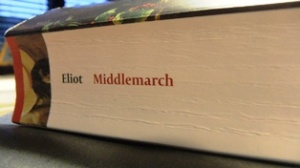
I need only one word whenever I am asked, “What’s your all-time favorite book?”
Eliot, George. Middlemarch: A Study of Provincial life. 1872. New York: Penguin Putnam, 1994. Print.
Genre: fiction (19th century British)
Summary: An idealistic young woman and a noble-minded doctor enter disastrous marriages. The consequences of their choices ripple through the wider community. Both doctor and woman might find redemption and rediscover hope if they can find each other amidst rigid class structures and isolating social barriers.
Critique: True, all print editions of Middlemarch are roughly the size and weight of a brick.
Doubly true, you are unlikely to heed even my most urgent pleas and gushing recommendations to read any brick-like book.
I urge you nonetheless because Middlemarch is precisely the brick we all need to come crashing through our windows.
Writers can gawk at Eliot’s tenacity. To construct the masterwork, she wove together two going-nowhere projects that chewed up countless months of her writing time. At first, there was the tale of an ambitious doctor, Tertius Lydgate, foisting modern medical treatments on a backwards British village. When that rough draft petered out, Eliot switched to a new story about the ingenuous Dorothea Brook, whose marriage to a fusty scholar twice her age does not result in the spiritual and intellectual self-refinement she desires. Once again, the rough draft stymied. While most writers might have abandoned the second project and gone on to a third, Eliot saw a connection between the two protagonists. She identified parallels in the stories and combined them.
I suppose she hit two stones with the same bird.
All readers—whether they are writers or not—can marvel at how Eliot’s narrator repeatedly expands the focus out from the two heroes to the supporting cast of characters as the repercussions resulting from the unfortunate marriages rumble across the community. The more we learn about other characters and how their lives are impacted by Dorothea and Lydgate, the more we discover our untold potential for compassion.
Of course I could readily empathize with Dorothea—the pitiable young dynamo who marries an abusive nerd-turd, Mr. Casaubon. I was that young dynamo at one point in my life. I was in that very relationship. But then, the narrative shifts and presents Casaubon’s inner working. Suddenly, I discover how, at other times in my life, I have also been a nerd-turd—jealous, suspicious, and trying to mask my paralyzing self-defeating fear with pedantry. The more I read, the more I realize how many “others” I am and have been. When I read Middlemarch—which happens annually at this point—I feel my fundamental connection to all beings.
When I read Middlemarch, I feel my own infinity.
This brick-like book smashes my perception of the world made of strangers. Through the eyes of the Middlemarch narrator, we are all familiars.
I am borrowing, and promise to give back, the brick comparison from Rebecca Mead’s My Life in Middlemarch (2014), a memoir told through the guise of a literary examination of the novel plus a biography of George Eliot.
Naxos AudioBooks produced an exceptional, unabridged recording of the novel. Juliet Stevenson’s reading is powerful. Her finesse with diverse character voices is also stunning!
Jonathan D. Culler notes in his 2004 essay “Omniscience” that Eliot’s narrator is not actually omniscient, but heterodiagetic. That is to say, a person who is not directly involved in the plot or the world of the novel (AKA the diagesis), but who has elected to sift and present germane information for the reader’s consideration. Indeed, the Middlemarch narrator refers to itself as a historian making a case study of the town and its folk. (Culler’s larger point about the impossibility of god-like omniscience in any story is well worth reading.)
Note: As always, I do not earn commissions or other compensation for any of the books/audiobooks I recommend.
Comments